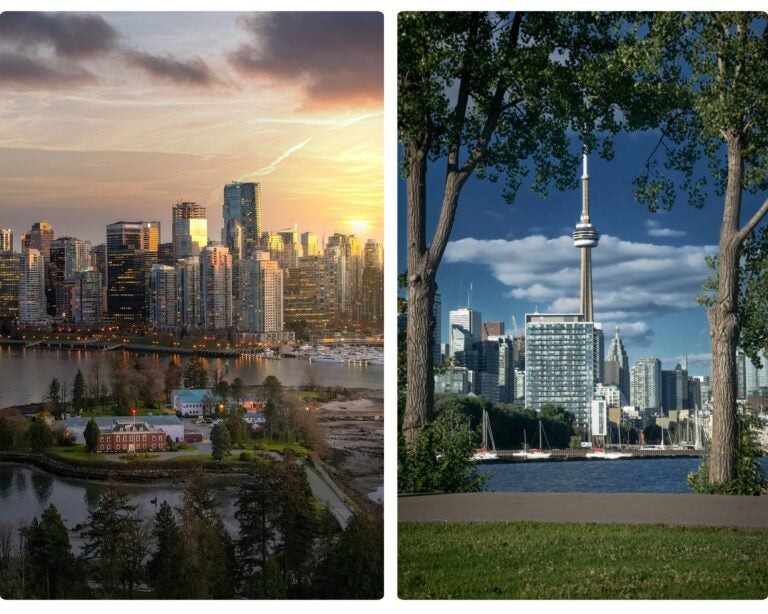Live in Canada: Advantages, disadvantages & costs
Find here the information that will guide you about the lifestyle and what it is like to live in Canada, advantages, disadvantages and tips.
Canada consistently ranks among the best places in the world to live, and it’s no wonder why. With its high quality of life, welcoming attitude toward newcomers, and strong multicultural identity, it’s a top choice for anyone thinking about relocating. In fact, over 20% of the people living in Canada were born in another country, making it one of the most immigrant-friendly nations globally. If you’re considering a move, here’s what you should know about what it’s like to live in Canada.
We’ll take a look at key topics like quality of life in Canada, how the healthcare and education systems work, the pros and cons of moving there as a foreigner. That way, you’ll have all the information you need to decide whether Canada is the right destination for your next move.
Quality of life in Canada
When we talk about quality of life in Canada, we’re talking about a country that consistently ranks in the top 10 of the Global Social Progress Index and leads OECD charts in areas like education, healthcare, and safety. While we’ll touch on some of the downsides later, Canada offers a strong and stable environment to live in.
Education in Canada
If studying abroad is on your radar, Canada is definitely a destination worth considering. According to the 2024 QS World University Rankings, several Canadian universities rank among the top 100 in the world, including:
- University of Toronto (ranked #21 globally)
- McGill University (#30)
- University of British Columbia (#34)
Canada also stands out for its broad access to higher education and its strong investment in research and innovation (OECD, 2023). Some of the most prominent fields of study include engineering, computer science, business, medicine, and the creative arts.
One of the great perks of studying in Canada is that international students are allowed to work while they study (a big plus for those looking to help cover their living expenses). If you want to learn more about what it’s like to study in Canada as an international student, check out this article.
Safety in Canada
One thing that really sets Canada apart is how safe it is. It’s consistently ranked among the most peaceful countries in the world. In fact, it came in 11th on the 2023 Global Peace Index. Violent crime is relatively rare compared to many parts of the Americas and Europe. Of course, like in any major city, there are a few neighborhoods where it’s smart to stay alert—Downtown Eastside in Vancouver, for example, is known for having more challenges than other areas.
City life in Canada tends to feel pretty laid-back. It’s common to see people walking around with their phones out or leaving their bikes unlocked without much worry.
Economy and cost of living
Canada is not cheap. But also wages are high and public services are very good, here are some facts:
- The minimum wage varies by province, but averages around 16 CAD per hour in 2025 ($11.75).
- The cost of living in Canada really depends on where you are. In big cities like Toronto and Vancouver, you might need between 2,200 and 3,000 CAD ($1,600-2,200) a month to live comfortably as a student or young professional. But in smaller cities like Halifax or Winnipeg, you can get by quite well on 1,500 to 2,000 CAD ($1,100-1,500) a month.
Canada also has immigration programs that make it easier for international students and workers to apply for a work visa after finishing their studies.
Health system in Canada
Canada has a publicly funded, universal healthcare system, which means basic medical services are free or heavily subsidized if you’re a resident—even on a temporary visa as a student or worker. The downside? Wait times for non-urgent procedures or specialist appointments can be quite long.
- Life expectancy in Canada is 82 years, one of the highest in the world (OECD, 2024).
- The Health System Performance Index places Canada in the top 15 globally.
- If you’re coming to Canada as a tourist, student, or on a work visa, you’ll need to have private health insurance until you’re eligible for public coverage.
Digital connectivity in Canada
Internet in Canada is high quality, fast and with very good national coverage, some of the data include:
- Average fixed connection speed of 233 Mbps and mobile of 93 Mbps (Speedtest Global Index, 2024).
- There is 4G/LTE internet coverage in 99% of the populated territory.
- Main operators: Bell, Rogers, Telus (fixed and mobile).
However, mobile data plans are more expensive than in other countries, with an average of 50 CAD ($35) per month for a basic plan.
To make your arrival in Canada hassle-free, it’s a great idea to set yourself up with a Holafly eSIM. You’ll get unlimited data and easy activation which is ideal if you want to be connected from the moment you step off the plane.
If you need a reliable, hassle-free connection that lets you share mobile data with other devices, Holafly Plans is perfect for remote work or studying without worrying about losing your connection.
Important: If you are a frequent traveler and want to stay connected without worrying about expensive roaming or looking for a new SIM at every destination, Holafly’s subscription plans are for you. With a single eSIM, enjoy internet in more than 170 countries for a fixed price and no surprises on your bill. Travel without limits and connect easily and securely! 🚀🌍

Advantages of living in Canada
Canada continues to strengthen its reputation as an attractive destination, thanks to its high quality of life and the many benefits it offers to foreigners looking to settle there.
Let’s explore some of the main benefits of living in this North American country.
High quality education
Canada is known worldwide for offering top-quality education to international students. Its education system is recognized for high academic standards, world-class research institutions, and a diverse, inclusive learning environment.
Some advantages of studying in Canada are:
- Job opportunities: International students are allowed to work part-time while studying, which helps them cover expenses and gain valuable work experience in Canada at the same time.
- Flexibility: Canadian colleges and universities offer flexible programs that let students tailor their studies to fit their goals and needs.
- Affordable cost: Compared to other developed countries such as the United States or the UK, the cost of studying in Canada is relatively affordable.
- International recognition: Employers around the world recognize Canadian academic credentials, which makes it easier to find jobs in other countries.
Outstanding educational institutions:
Canada has numerous high-quality educational institutions, including world-renowned universities and colleges. For example:
- Universities: University of Toronto, University of British Columbia, McGill University, University of Waterloo, McMaster University.
- Colleges: Seneca College, Humber College, George Brown College, Camosun College, Durham College. A positive thing about colleges is that they are less expensive than universities and give you the option to get into the job market faster.
Inclusive and multicultural society
One of Canada’s biggest draws is its inclusive nature. With immigration policies that celebrate diversity, it’s common to find communities made up of people from all over the world. Cities like Toronto and Vancouver are known for their multicultural vibe, where you’ll experience a rich mix of languages, cuisines, and cultural traditions every day.
Canada’s supportive atmosphere makes it easier for newcomers to adjust, with plenty of community groups, immigrant associations, and government programs to help with settling in. The country embraces multiculturalism through laws and regional policies that encourage inclusion and respect for all cultures. For example, religious clothing like turbans are accepted in official roles such as police or military uniforms, and inclusive education is a key focus nationwide.
Canada offers a privileged natural setting
Thanks to its location, Canada is home to some of the world’s most breathtaking natural scenery. The Canadian Rockies are a must-see, featuring stunning parks and incredible views. You can also catch the spectacular Northern Lights up in Yukon.
If you love being outdoors, Canada is ideal, with activities like hiking, skiing, canoeing, and mountain biking available throughout the year. Plus, there’s a strong commitment to protecting the environment, with strict policies and a culture that truly values preserving these natural spaces.

Career opportunities for foreigners
On the positive side, the Canadian job market is dynamic and often open to foreign talent, especially in strategic sectors such as:
- Information technology
- Engineering
- Health care
- Education
- Agriculture and technical trades.
Programs like Express Entry and the Provincial Nominee Programs (PNP) offer skilled professionals a faster path to permanent residency, as long as they meet the necessary criteria.
Quality of public transportation
In Canada’s major cities, public transportation is reliable, safe, and affordable. Systems like Toronto’s TTC subway and the bus and train networks in Vancouver and Montreal provide solid urban and regional connections. While driving is more common in rural areas, overall Canada is working to promote sustainable transportation options, including bike lanes and car-sharing programs.
Disadvantages of living in Canada as a foreigner
Although Canada offers many opportunities, be aware of certain challenges that can affect your experience in the country.
High cost of living in some cities
Living in cities like Toronto, Vancouver, or Montreal can get pricey. For example, renting a one-bedroom apartment downtown Toronto often costs over 2,000 CAD ($1,460) a month (not including utilities).
On top of that, everyday expenses like food, transportation, and entertainment tend to be higher than in many other cities worldwide. It’s estimated that people spend around 300 to 500 CAD ($200-350) a month on groceries, 200 to 400 CAD ($140-300) on leisure activities, and 100 to 150 CAD ($70-100) on public transit.
Therefore, those planning to relocate should budget or consider alternative cities such as Halifax, Calgary or Winnipeg, where the lifestyle is quieter.
Extreme winter in several regions
While some people love the snow and winter sports, Canadian winters can be quite a challenge for those used to warmer climates.
In cities like Ottawa or Winnipeg, temperatures can drop below -20°C, often with heavy snowstorms. Adjusting to the climate means investing in proper clothing, heating, and sometimes dealing with disruptions to your daily routine.
Rigorous immigration process
Canada’s immigration system is detailed and selective, focusing mainly on economic immigrants, family reunification, and humanitarian cases. The country looks for newcomers with skills and experience who can contribute to the economy, and the application process can be thorough, requiring a lot of documentation.
The immigration process in Canada usually has several stages:
- Eligibility assessment: The first step is to determine whether a person is eligible to enter Canada through a specific immigration program.
- Application and documentation: Once you determine your eligibility, you must complete a detailed application and submit the required documentation.
- Evaluation of the application: Immigration officials evaluate the application, verify the documentation, and determine whether it meets the requirements.

Difficulty in validating professional qualifications
The first thing you’ll want to do is check whether your degree is accepted in Canada. You’ll also need to confirm that the school you attended is accredited and that your program meets Canadian standards. It’s a good idea to reach out to the relevant provincial or territorial authorities to understand the specific requirements for validating your credentials.
What makes the process difficult?
- Differences in education systems: The education system in Canada may differ significantly from the system in your home country. This may raise concerns about the equivalency of your degree.
- Variety of provincial and territorial requirements: Each province and territory in Canada has its own requirements for the validation of foreign degrees.
- Need for credential evaluations: In some cases, an authorized service must evaluate your credentials to compare your degree to Canadian standards.
- Official translations: If your degree is not in English or French, you will need certified official translations.
Frequently asked questions about living in Canada
Generally yes. Multiculturalism makes it easy to adapt, although the climate and the immigration process may require some adjustment.
It depends on the city, but for a single person it can range between 2,000 and 3,500 CAD ($1,460-2,560), considering housing, food, transportation and other basic expenses.
Access to the public health system varies according to province and immigration status. In many cases, we recommend taking out international health insurance for the first few months.
It depends on your priorities: Toronto and Vancouver offer more employment and urban life, while cities such as Ottawa, Calgary or Quebec are rather quiet.
Yes. Most study permits allow you to work up to 20 hours per week during the academic period and full time during vacations.





 Language
Language 


















 No results found
No results found



